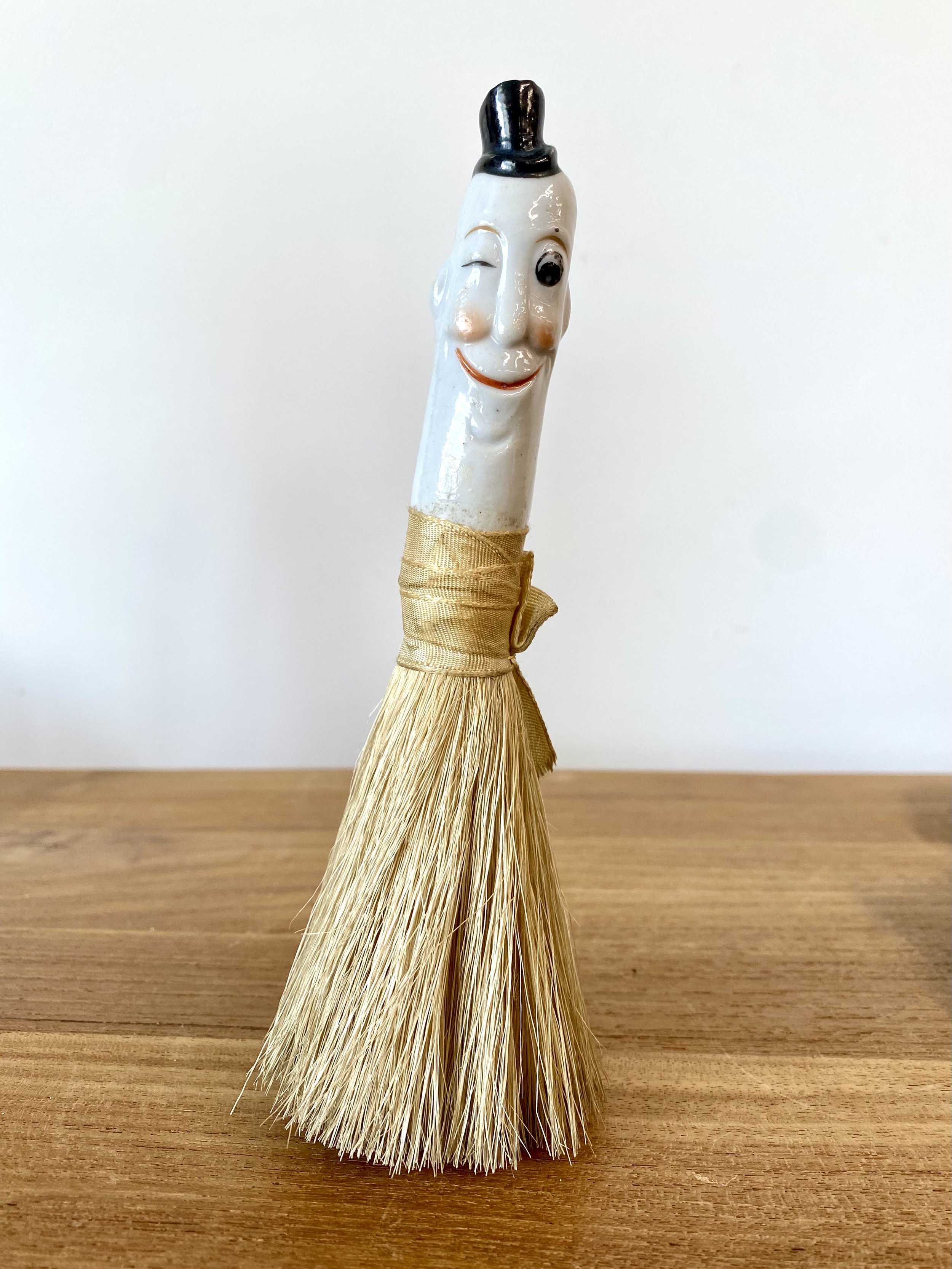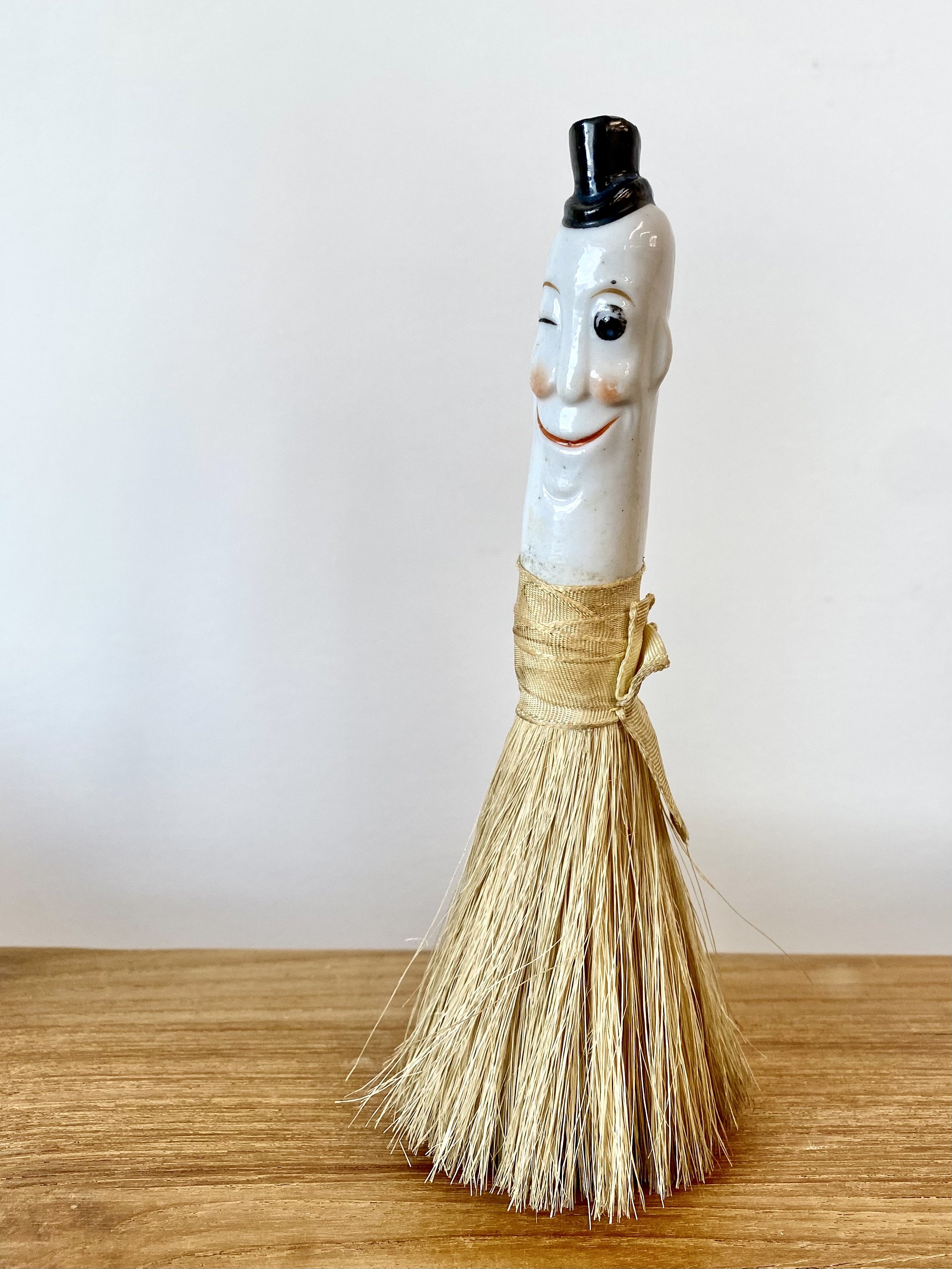 Image 1 of 4
Image 1 of 4

 Image 2 of 4
Image 2 of 4

 Image 3 of 4
Image 3 of 4

 Image 4 of 4
Image 4 of 4





Stan Laurel Whisk Broom
A small whisk broom with a porcelain figural handle, depicting the British-American comedian Stan Laurel. Laurel is best known as one-half (with Oliver Hardy) of the seminal comedy team Laurel and Hardy. He started out in the British dancehall comedy circuit, then moved on to silent film (as an actor, writer, and director), before eventually teaming up with Hardy in the 1920s. The simple label “Japan” dates this object to the period 1890-1922.
Something about the long-suffering Laurel, constantly abused by his bombastic partner, had cross-cultural appeal. The great Japanese director Yasujiro Ozu (best known for the classics "Late Spring" and Tokyo Story") began his career with the Laurel and Hardy-inspired slapstick comedies “A Straightforward Boy” and “Fighting Friends.”
Silent films survived in Japan longer than in the West, even after WWII. This is partly due to the uniquely Japanese tradition of the benshi (talker), a live performer who accompanies the action on the screen with a play-by-play commentary. This may include actual dialog and sound effects, but also personal commentary and editorial remarks. The benshi were immensely popular, many becoming stars in their own right! They even persisted after the rise of the "talkies" — editorializing right over the soundtrack. Wonderfully, the benshi tradition is enjoying a renaissance in modern Japan, deflating some of Hollywood's power by making films more culturally-relevant.
A small whisk broom with a porcelain figural handle, depicting the British-American comedian Stan Laurel. Laurel is best known as one-half (with Oliver Hardy) of the seminal comedy team Laurel and Hardy. He started out in the British dancehall comedy circuit, then moved on to silent film (as an actor, writer, and director), before eventually teaming up with Hardy in the 1920s. The simple label “Japan” dates this object to the period 1890-1922.
Something about the long-suffering Laurel, constantly abused by his bombastic partner, had cross-cultural appeal. The great Japanese director Yasujiro Ozu (best known for the classics "Late Spring" and Tokyo Story") began his career with the Laurel and Hardy-inspired slapstick comedies “A Straightforward Boy” and “Fighting Friends.”
Silent films survived in Japan longer than in the West, even after WWII. This is partly due to the uniquely Japanese tradition of the benshi (talker), a live performer who accompanies the action on the screen with a play-by-play commentary. This may include actual dialog and sound effects, but also personal commentary and editorial remarks. The benshi were immensely popular, many becoming stars in their own right! They even persisted after the rise of the "talkies" — editorializing right over the soundtrack. Wonderfully, the benshi tradition is enjoying a renaissance in modern Japan, deflating some of Hollywood's power by making films more culturally-relevant.
A small whisk broom with a porcelain figural handle, depicting the British-American comedian Stan Laurel. Laurel is best known as one-half (with Oliver Hardy) of the seminal comedy team Laurel and Hardy. He started out in the British dancehall comedy circuit, then moved on to silent film (as an actor, writer, and director), before eventually teaming up with Hardy in the 1920s. The simple label “Japan” dates this object to the period 1890-1922.
Something about the long-suffering Laurel, constantly abused by his bombastic partner, had cross-cultural appeal. The great Japanese director Yasujiro Ozu (best known for the classics "Late Spring" and Tokyo Story") began his career with the Laurel and Hardy-inspired slapstick comedies “A Straightforward Boy” and “Fighting Friends.”
Silent films survived in Japan longer than in the West, even after WWII. This is partly due to the uniquely Japanese tradition of the benshi (talker), a live performer who accompanies the action on the screen with a play-by-play commentary. This may include actual dialog and sound effects, but also personal commentary and editorial remarks. The benshi were immensely popular, many becoming stars in their own right! They even persisted after the rise of the "talkies" — editorializing right over the soundtrack. Wonderfully, the benshi tradition is enjoying a renaissance in modern Japan, deflating some of Hollywood's power by making films more culturally-relevant.